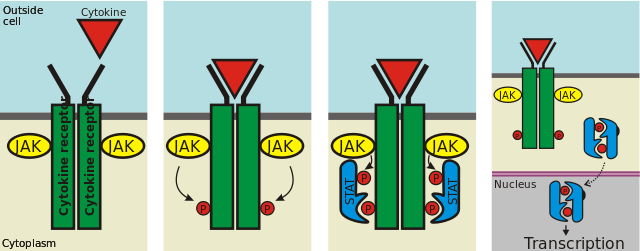T-cell leukemia is rare blood cancer in the own immune system. T-cell acute lymphoblastic leukemia, a special form of T-cell leukemia, was investigated by Belgian researchers with striking findings.
In a recently conducted patient study, a R98S mutation in ribosomal protein L10 recurred in 8% of children with T-cell acute lymphoblastic leukemia.
This protein plays an important role in the JAK-STAT signaling pathway which transmits chemical signals from the extracellular matrix into the nucleus and finally influences the transcription of DNA and expression of genes.
(By Peter Znamenkiy – Own work, Public Domain, https://commons.wikimedia.org/w/index.php?curid=912703)
The group of Kim de Keersmaecker from KU Leuven in Belgium investigated this mutation in greater detail by creating a customized gene knock-in mouse model with PolyGene.
In the transgenic R98S mouse, several proteins in the oncogenic JAK-STAT pathway are overexpressed, and increased sensitivity to clinically used JAK-STAT inhibitors like pimozide was observed. These findings link a ribosomal mutation to the JAK-STAT pathway, adding to the rapidly expanding repertoire of oncogenic mechanisms exploited by ribosomal defects in cancer. Moreover, the JAK-STAT cascade was identified as an attractive therapeutic target in RPL10 R98S positive T-cell acute lymphoblastic leukemia.
Interested in knock-in services for your gene(s) of interest? PolyGene offers:


